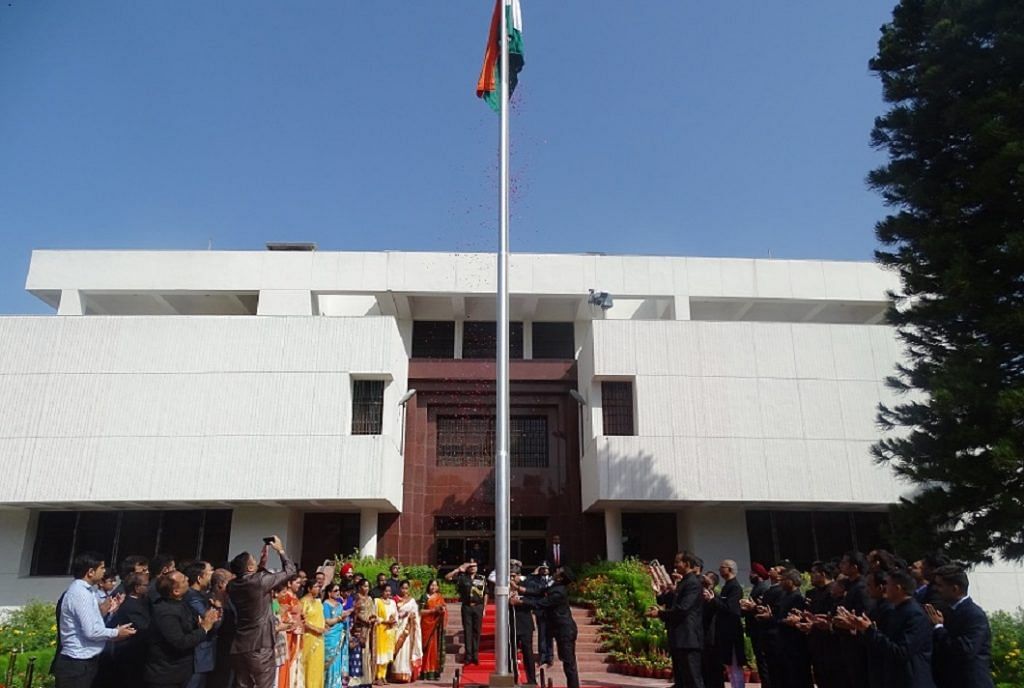A Pakistani statement detailed incidents of ‘deliberate bullying’ of officers, staff & families of the High Commission in New Delhi. India called it a two-way street.
New Delhi: In the latest chapter in the tense saga of Indo-Pak relations, both countries have accused each other of mistreating diplomats, after complaints from both sides about constant intimidation from unknown persons.
Pakistan Thursday called back its High Commissioner to India, Sohail Mehmood, reportedly to discuss a number of incidents of harassment of its diplomats in India.
Why did Pakistan call its envoy back?
Two days ago, the Ministry of Foreign Affairs in Pakistan put out a press release stating that officers, staff and families of the Pakistan High Commission in New Delhi had been facing “intense harassment, intimidation, and outright violence from Indian state agencies”.
The statement said there was an exponential increase in incidents of harassment over the last few weeks, and listed several such incidents as “deliberate bullying”.
On 7 and 8 March, children of Pakistani diplomats were allegedly harassed on their way back from school. Their cars were stopped, and unidentified persons filmed them and took pictures of them. When the High Commissioner protested, the harassment intensified, and staff at the High Commission were threatened. The gas connection to the High Commission Residential Complex was also cut.
The next notable incident listed happened on 9 March, when the Naval Advisor’s car was “aggressively chased”. The Counselor Political was also forced out of his cab and threatened and abused, on the same day.
On 12 March, technicians working at the High Commission were allegedly threatened. In addition, High Commission drivers were stopped from working, and their mobile phones were forcibly turned off. On 13 March, the children of the Counselor were followed all the way home, and filmed and photographed.
“The total apathy and failure of the Indian government to put a halt to these despicable incidents, sparing not even young children, indicates both a lack of capacity to protect foreign diplomats posted in India, or a more reprehensible, complicit unwillingness to do so,” the statement said.
Last week, a demarche was issued, and Pakistan threatened to pull its diplomats and their families out of India if this intimidation didn’t stop. The Pakistani government also put out a video filmed by a diplomat — of his car being deliberately blocked by a slow-moving car in New Delhi.
The Indian response
The Ministry of External Affairs had said that these incidents would be investigated. However, the MEA was quick to point out that this kind of harassment is a two-way street.
Indian diplomats in Pakistan, too, have been having a rough time, and the MEA has said that “harassment is the new normal for Indian High Commission personnel in Islamabad”.
A person familiar with the issue said on the condition of anonymity that “the Indian High Commission in Pakistan has been facing tremendous harassment for long, particularly in the last year”.
“However, Indian diplomats chose to tackle this matter with quiet and persistent diplomacy rather than by airing issues in the media,” the same person said.
The Indian High Commissioner in Islamabad, Ajay Bisaria, met the Foreign Secretary of Pakistan on 16 February to lodge a protest against the treatment of Indian personnel in Pakistan, describing them as “multiple acts of hooliganism”.
Constant surveillance, violations of physical space and invasion of privacy are issues that Indian diplomats allegedly face in Pakistan. They claim to be recorded and photographed by unknown persons without their consent, and are often followed. In another incident, a diplomat’s house was broken into and his laptop was stolen.
Due to this “atmosphere of intimidation”, most families of Indian diplomats in Pakistan have returned home, making the country an unpopular posting for diplomats.
Indian diplomats have also been stalled and intimidated in traffic, with Bisaria’s car being stopped in the middle of the road and creating a traffic hazard while he was on his way to an event.
Bisaria raised the issue of Indian diplomats being denied membership at the Islamabad Club, which is apparently otherwise open to all foreign diplomats.
Additionally, the ISI Monday raided the residential complex under construction in Islamabad, meant for Indian diplomats. The electricity and water supply was disconnected, and the power supply allegedly wasn’t restored for over two weeks.
Has this happened before?
India and Pakistan regularly accuse each other of spying on and pestering diplomats.
In 2001, India accused Pakistan of illegally roughing up and searching two diplomats in Islamabad. The Indian foreign ministry alleged in 2002 that Pakistan had abducted a member of the Indian High Commission, and that he had been beaten up by Pakistani intelligence personnel.
In 2003, the Indian Charges d’Affairs in Pakistan, Sudhir Vyas, had his vehicle blocked twice while he was travelling to an event. It was repeatedly and forcibly stopped and boxed in by four vehicles and two motorcycles. Pakistan denied these allegations, calling them deplorable when Pakistani diplomats in India were constantly intimidated.
Another “tit-for-tat espionage row” took place in the same year, when diplomats from both countries were expelled.
In 2013, the Indian government accused the Pakistanis of kidnapping a diplomat’s wife and harassing women and children. In response, Pakistan listed “cases of physical torture” of their officials since November 1988, when their military attache, Brigadier Abbasi, was arrested on the charge of trying to “purchase documents from his contact”, according to an India Today article.
The Pakistani High Commission staff was allegedly not allowed to celebrate Eid properly in New Delhi in 2015.
In October 2016, India expelled Mehmood Akhtar, a member of the Pakistani High Commission, for “espionage”. In retaliation, Pakistan expelled the Indian diplomat Surjeet Singh the next day on similar charges, saying he had violated “the Vienna Convention and established diplomatic norms”.
